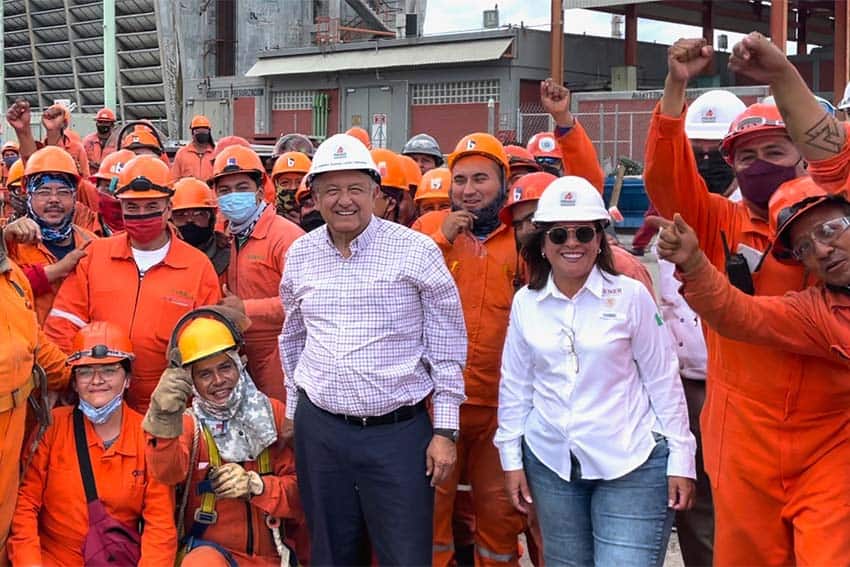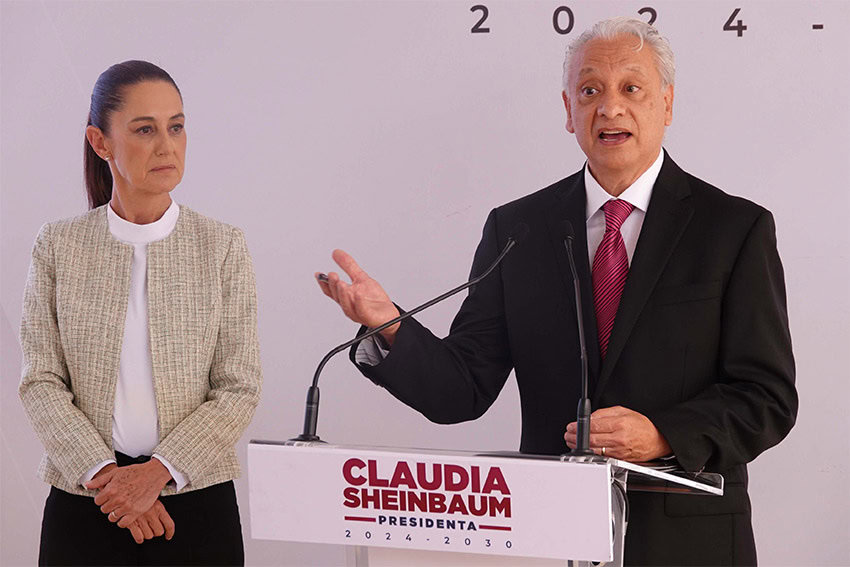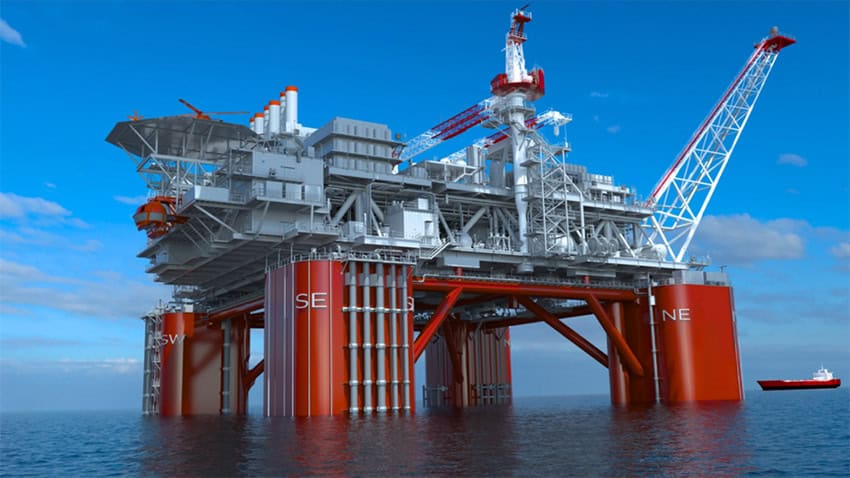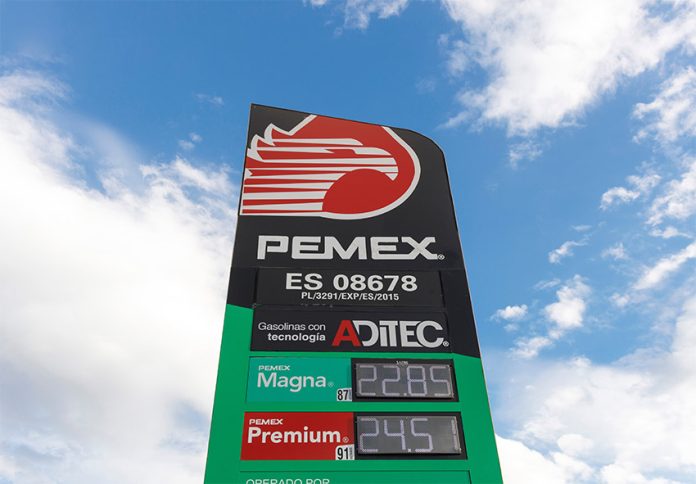Mexico’s heavily indebted state oil company has a new CEO, and will take a new direction during the six-year term of President Claudia Sheinbaum, an internal Pemex document indicates.
The document, seen this week by the Reuters news agency, indicates that Pemex will develop new business models to attract investment during Sheinbaum’s 2024-30 administration.
It also shows that Pemex will ramp up deepwater oil exploration, and that the state-owned company is aiming to increase its hydrocarbon reserves and ensure their restitution during the coming years.
Sheinbaum, sworn in as Mexico’s first female president on Oct. 1, and Pemex’s new CEO, Víctor Rodríguez Padilla, face a monumental task to turn around the fortunes of the state oil company, which has debt of around US $100 billion.
The administration of former President Andrés Manuel López Obrador poured money into Pemex, decreed major tax relief for the company and increased its refining capacity by building a new refinery on the Tabasco coast and purchasing Shell’s share of a jointly-owned refinery in Texas.
But the “rescue” of Pemex that López Obrador frequently spoke about is still far from complete, as demonstrated by the company’s levels of debt and its oil production capacity, which is just half what it was 20 years ago.

Pemex currently produces around 1.5 million barrels per day (bpd) of oil, compared to more than 3 million bpd in 2004. Reuters reported that by “adding condensate, a natural gas liquid that is similar to a very light crude oil,” Pemex’s production is 1.8 million bpd.
When he was announced as the next CEO of Pemex in August, Rodríguez, an energy economist and engineering academic, attributed the decline in oil production to “geological maturity [of oil fields], lack of investment, carelessness, negligence and a cunning plan to privatize the company” during the so-called neoliberal period of 1982 to 2018.
New business models
Citing the internal Pemex document it saw, Reuters reported that the state oil company will seek to develop new business models to attract external investment, something that López Obrador — a staunch critic of the 2013 energy reform — did not seek.
In August, Reuters reported that the Sheinbaum administration would “encourage state oil producer Pemex to seek equity partnerships with private oil companies, a model out of favor with the current president, in a bid to boost reserves amid towering debt.”

The news agency said that information came from “four sources familiar with the matter.”
Partnerships with private firms would be similar to joint ventures Pemex entered into after the 2013 energy reform, which opened up Mexico’s oil and electricity industries to private and foreign companies.
Pemex already has a partnership with Australian company Woodside Energy to develop the Trion deepwater oil field, located in the Gulf of Mexico off the coast of Tamaulipas.
That partnership, in which Pemex has a 40% stake, dates back to 2017, when the government of former president Enrique Peña Nieto — which enacted the energy reform — was still in office.
Pemex’s oil exploration plans
The López Obrador government faced criticism for investing so heavily in new and existing refineries, with various analysts arguing that the move was unwise as it took money away from Pemex’s more profitable oil exploration business.
Now, the Sheinbaum administration appears set to put more emphasis on exploration.
In addition to intensifying deepwater exploration, the Pemex internal document indicates that the company will maintain onshore exploration, Reuters said.
The document also shows that Pemex will maintain exploration in shallow waters and in areas adjacent to existing production fields.
Efforts will focus on choosing exploration and production projects that offer the “greatest potential for success and profitability,” the document said.

Pemex, Reuters said, will also aim to mitigate the decline of existing oil fields and strengthen the development of new ones.
The Trion field — in which Woodside and Pemex are investing billions of dollars — is expected to produce 110,000 barrels per day (bpd) of crude and 2.5 million cubic meters of gas a day beginning in 2028.
Pemex discovered the field — located at a depth of 2,500 meters about 180 kilometers off the Tamaulipas coast and 30 kilometers south of the Mexico-United States maritime border — in 2012.
The role of Pemex in the energy transition
President Sheinbaum, a climate scientist who worked with the Intergovernmental Panel on Climate Change that won the 2007 Nobel Peace Prize, has pledged to invest heavily in renewable energy projects during her term in government.
In August, Rodríguez said that Pemex will play a “fundamental role” in Mexico’s transition to greater use of renewable energy sources.
“Pemex won’t limit itself to making oil and gas condensate as it has always done,” the now-CEO said.
“We’re going to do new projects. We’re going to have partnerships with society, with universities, with business people, to do the projects of the future. We’re going to produce wind energy, solar energy, offshore wind energy. We’re going to produce strategic materials including lithium,” Rodríguez said.
Sheinbaum is aiming to increase the participation of renewables in energy generation to 45% by 2030, almost doubling their current participation.
Sheinbaum committed to ‘energy sovereignty’
In 2020, former president López Obrador pledged that Mexico would be self-sufficient in gasoline by 2023 through the rehabilitation of Mexico’s six existing refineries and the construction of the Olmeca Refinery on the Tabasco coast.
He didn’t achieve that goal, but he did reduce reliance on gasoline imports, which primarily come from the United States. Former Pemex CEO Octavio Romero presented projections in January that showed that self-sufficiency could be achieved in 2027.
Earlier this month, Sheinbaum noted that crude exports have been reduced in order to increase gasoline production in Mexico’s refineries, and expressed her commitment to advancing the “energy sovereignty” project.
New energy reform ratified by state legislatures
The new energy reform bill approved by the Senate last week has now been ratified by a majority of Mexico’s 32 state legislatures, meaning that President Sheinbaum can sign it into law.
Twenty state legislatures including those in México state, Oaxaca, Puebla, Sinaloa, Sonora, Yucatán and México state ratified the reform, which constitutionally enshrines state dominance in the electricity sector, among other objectives.
As a result of the reform, the Federal Electricity Commission and Pemex will no longer be called “productive” state companies, but rather “public” state companies.
The Bloomberg news agency reported earlier this month that Sheinbaum will “gain increased control over Pemex and the national electricity utility” thanks to the reform, reducing their autonomy and allowing the president to closely align their objectives with those of her government.
